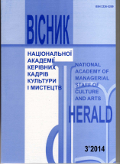МУЗИЧНА ІСТОРІОГРАФІЯ ТА ЇЇ СУЧАСНІ УМОВИ
Music historiography and its modern facilities
Author(s): Volodymyr IonovSubject(s): Anthropology, Fine Arts / Performing Arts, Music
Published by: Національна академія керівних кадрів культури і мистецтв
Keywords: music; musical historiography; culture; musicological text meta-language;
Summary/Abstract: Contemporary musical creativity with its stylistic accretions and his quest sufficiently rigorous stylistic limitations pushes for changes in the nature of musicology, musicological text. Therefore, the part of musicology (as well as other modern art history research) musical historiography is able to obtain a substantial theoretical assistance. This assistance, for musicological experience, signifies consolidation of ideas about music science possibilities and historical responsibilities, that will light up and clearly define the place of musicological observations in the formation of the individual's consciousness – a necessary part of self-culture.Thus problems of musical semantics appears in the center of the musical historiography as modern musicology. Its new subject orientation we can define as semasiological. In the current musicological positions it is combined with the demonstration of personal views; today it is possible to speak of an emerging "author musicology," not subordinate to the internal scientific and disciplinary authority – the traditional concepts and their application.Works of Lyashenko, I. Yudkin, L. Kiyanovsky, A. Kozarenko present orientation of innovated culture musical historiography. They develop complicated problems of musical art national character peculiarities, of an antinomy of internal and external constraints of the national style in music, that is, the interaction of it "own" – "alien", "centripetal" and "centrifugal" tendencies. Thus, they support the Bakhtin’s idea that culture is "going on at the borders." The works of these authors make it possible to admit that the most appropriate, methodically defined and vindicated meta-theoretical orientation among possible is historiographical.Culture, due to the impermanence of social life, provokes dramatic situations, crises at each stage of its evolution. The end of time feeling has become a necessary feature of every important artistic personality in the history of art. This premonition of the end can be seen as a manifestation of national passionarity that most fully satisfies the romantic system of philosophy. Musical art, artistic activity appears to be a way to harmonize not only internal, but also external world of man, promotes the creation of centers, movements, associations, and other creative groups. This encourages the development of choral liturgical and folk-song genres, explains the leading role of traditional choirs in the Ukrainian musical practice. Musical and linguistic proximity Ukrainian, Polish, German, Austrian, Russian artists promote coordination of borders as between different national communities, and between different types of national consciousness. So there is a phenomenon of modern Lviv composer school.Today the special place of sacred music in the Ukrainian culture is confirmed by the appearance of new synthetic religious and secular models of spiritual works. Priority of the spiritual and religious musical practice becomesan important reason for the constant attention of Ukrainian composers to the Word, to different ways of connection between music and word. This search of "own Word" is complicated by the proximity of the Latinized linguistic tradition, the frame of Catholic texts in Galician work.Today, when we meet Ukrainian Orthodox and Catholic Latin designations in one canonical musical piece, this is not the result of composer’s confessional negligence, it’s the expression of long-standing historical convention, which now takes on a new aesthetic value. This aspect of the verbal-linguistic differences, that becomes differences of music genre history, is still uncertain, although many historiographical and analytical musicological observations lead to it.Performing principles of musical activity become leading in many of the social and cultural situations as in ancient, so in modern musical culture. They may be preceded by composer’s principles, predetermine the choice and interpretation of genres, often entirely subordinate to the development of instrumental ensemble music. The interest to the figure of the musician – performer as a living individual who can and should embody the creative idea, agitate for a certain socio-artistic initiative, is becoming one of the convincing performance personal-romantic nature of Ukrainian art.By studying these phenomena modern Ukrainian musicology creates new historiography (as factual and methodological) coordinates on the way of understanding the problem of national in art. It is eloquent proof of the demand (engagement) for music and historiographical knowledge from the side of the cultural and historical present.Thereby musicological text becomes a subject of musicological reflection; musicology need to look at itself "in the mirror of musicological texts" (A. Berezovchuk). Through the self-actualization of musicology emerges the need to relate musicological text as a whole system, and the semantic content of the music. At the same time, musicological text can be described as a "virtual space", that simulates the researched music piece. This space includes various semantic projection, because it is a fiction, an artificial reality. It acts as an artifact – a mirror of cultural human consciousness, as well as music.Among basic orientations of musicological thought in its focus on the music phenomenon a process of forming in musical and artistic works appears to be leading, it often has a high degree of unpredictability, and therefore a significant information content. As musical creativity, musicology reveals semantics of "possible worlds" more than of "real".Music historiography must discover the historical meanings of culture – and not just in the process of becoming a single composition, but also in the total effect of music on the public consciousness. It is an important way to create a man’s "life-world" in his present and future.
Journal: Вісник Національної академії керівних кадрів культури і мистецтв
- Issue Year: 2014
- Issue No: 3
- Page Range: 159-165
- Page Count: 7
- Language: Ukrainian

